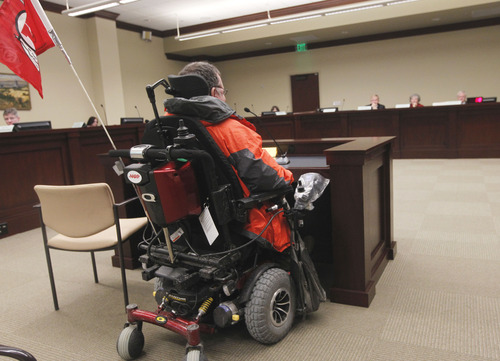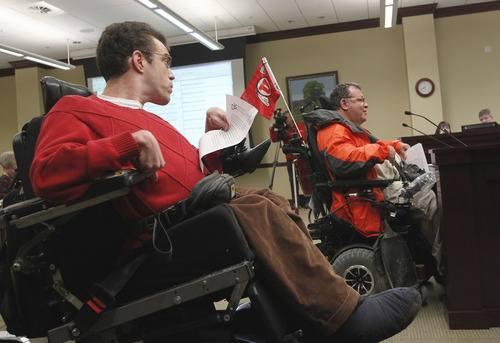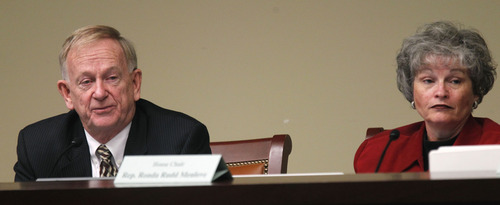This is an archived article that was published on sltrib.com in 2013, and information in the article may be outdated. It is provided only for personal research purposes and may not be reprinted.
More than a dozen advocates for low-income residents and the disabled pleaded with Utah lawmakers Friday to fund any costs involved in expanding Medicaid.
Raymond Ward, a family doctor, said Utah would send $450 million in tax money to other states if it opts out of the Medicaid piece of the Affordable Care Act.
"If we choose to expand the Medicaid program, we can get our share back," said Ward.
Access to basic health care often means the difference between one's ability to work and not work, said Ward, a member of the Utah Academy of Family Physicians, a 500-member group that endorses Medicaid expansion.
And sometimes such access "is the difference between living and dying," said Ward, who told of a friend who needed and received a pacemaker while serving a mission for the LDS Church but is unable to afford ongoing care for the device back home.
The decision to expand Medicaid to cover an estimated 145,000 more low-income Utahns is up to Gov. Gary Herbert, but if there are higher costs, the Legislature will have to approve the tab. Friday's public hearing was before the Social Services Appropriation Subcommittee.
Thirteen advocates spoke for Medicaid expansion, and the Utah Medical Association gave a hedged endorsement. Michelle McOmber, its chief executive officer, said 250 doctors debated the issue at a recent meeting.
"We don't have absolute agreement on Medicaid expansion," she said. Physicians want the state's approach to be sustainable, she added, and to "cover the maximum number of individuals in the most cost-effective way."
Among those pressing the Legislature to support an expansion were several residents with disabilities, including Kelie Babcock of the Grassroots Advocacy Partnership.
She has physical challenges and uses a wheelchair, but she earned a degree at Weber State University. Current income thresholds for Medicaid, however, mean she does not dare trying to get a higher-paying job. "I'm pigeonholed in an income bracket because … I need to have Medicaid."
Andy Curry, executive director of Roads to Independence, said that it will be a "wasted opportunity" if Utah rejects the Medicaid expansion. "The cost of doing nothing is worse," said Curry, who uses a wheelchair as a result of a car accident when he was a teenager.
Maude Norman spoke on behalf of a friend who ended up disabled in 2011 because he had no health insurance and did not get early treatment for spinal abscesses.
"So much money would have been saved if Don could have received medical care when it was small," she said. "We accept federal money for freeways, why not Medicaid?"
The federal government would pay 100 percent of the Medicaid expansion for the first three years, although Utah would have to cover administrative costs in those years. After that, the state and counties would have to pony up a gradually rising share, never to exceed 10 percent.
Matt Slonaker, Medicaid policy and collaborations director at the Utah Health Policy Project, urged lawmakers to "weigh the evidence and do the math."
Utah would get more than $5 billion over a decade to provide medical care for poor Utahns, he said. "Some worry about the federal government not keeping up with its end of the bargain," Slonaker said. "Maybe we could find a way to unplug if they don't."
Sen. Allen Christensen, R-North Ogden, co-chair of the committee, said there's good reason for caution.
The federal government often asks states to cough up more money as time goes on, Christensen said. Today's fiscal crisis makes that even more likely, he suggested. "Never has the federal government been in such a hole."
Preliminarily, the health department figures a Medicaid expansion would cost that department $1 million more for administration; the Department of Workforce Services, which handles enrollment, estimates it would cost its department $8 million, said Russell Frandsen, fiscal analyst for the subcommittee. Those costs, however, could be offset by $5 million in savings, he said.
Making the Medicaid decision
The state health department has commissioned a study of the costs of expanding — or not expanding — Medicaid, and its results are expected Feb. 19.
The Center on Budget and Policy Priorities counts Utah as one of nine states leaning against expanding Medicaid. Fourteen states plan to expand it, seven are leaning toward expansion and 21 are undecided.







